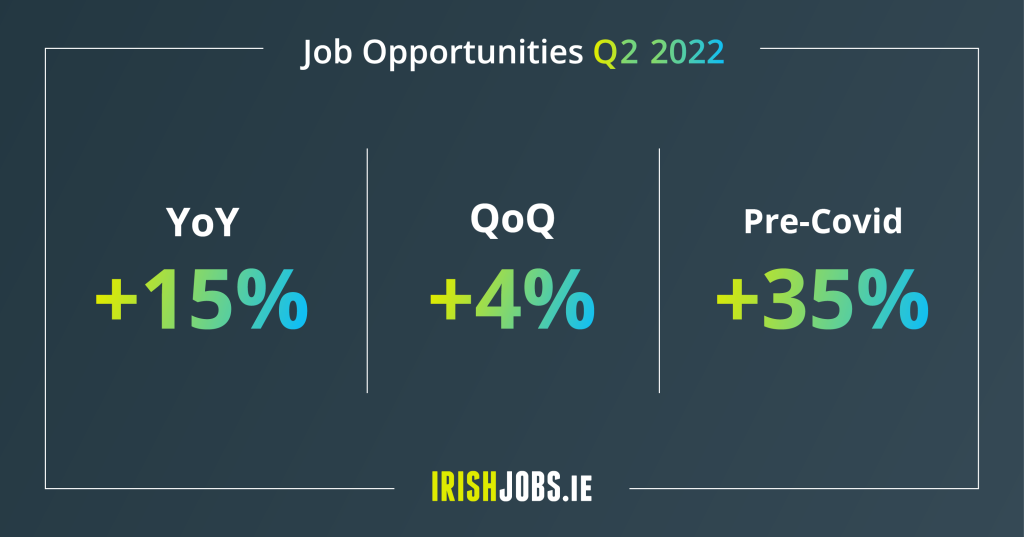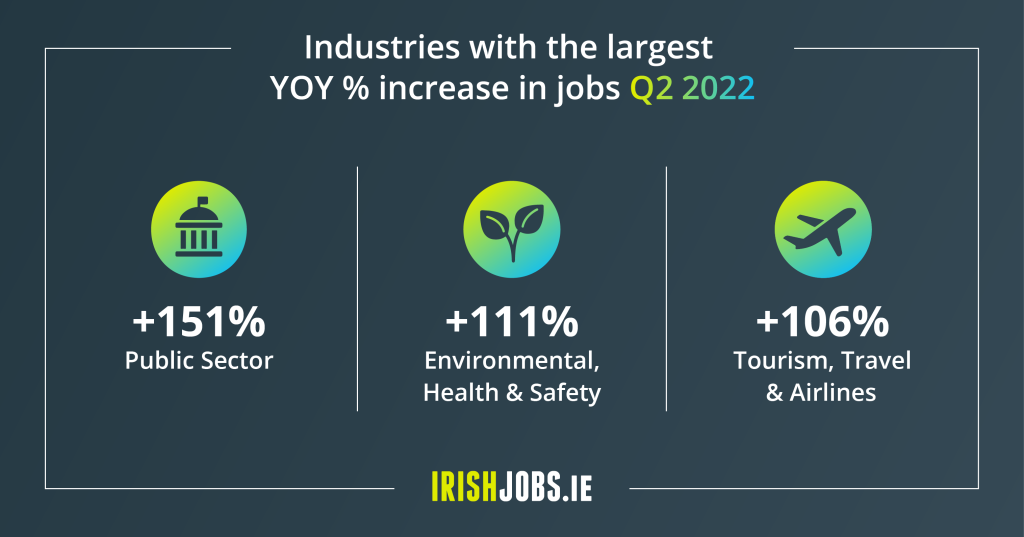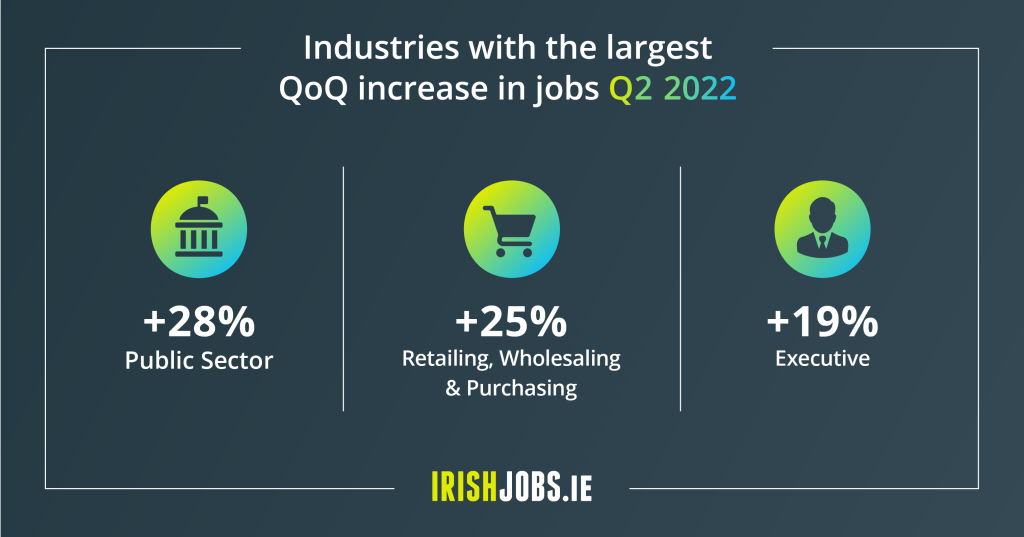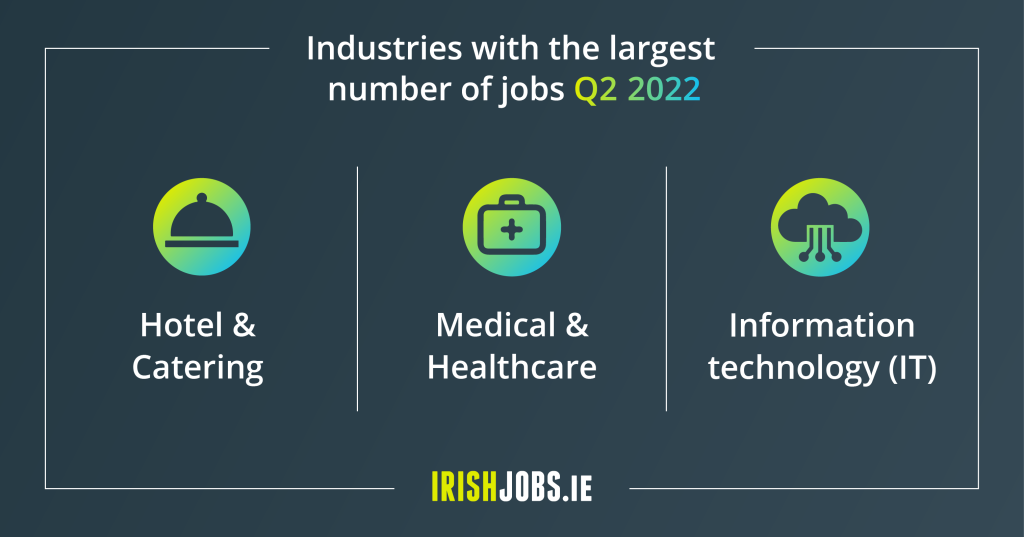
Leading hiring platform, IrishJobs.ie, has today published the results of its latest quarterly Jobs Index which highlights a continued stabilisation in the number of job vacancies available across the country.
While the Index reveals 15% year-on-year growth in the number of jobs available this quarter, this is a deceleration of growth compared to the year-on-year figure for last quarter (44%). In addition, quarterly growth is levelling out, with 4% job vacancy growth in the second quarter of 2022, slightly up from 3% growth in the first quarter of the year.

Industry analysis
Of the 30 sectors analysed in this quarter’s Index, 20 posted year-on-year increases in job vacancies in the second quarter of 2022, down from 22 posting year-on-year increases in the last quarter. Certain sectors have begun to experience a stabilisation in the number of job vacancies, following an acceleration in demand during the pandemic.
These include jobs in IT, which have increased by just 1% quarter-on-quarter and decreased by 12% year-on-year. Demand has also begun to slow in Science, Pharmaceutical & Food (-9% YoY and -5% QoQ) as well as Production, Manufacturing & Materials (-13% YoY and -9% QoQ).
Meanwhile, jobs in Banking and Financial Services are growing at a steady rate (+9% YoY and +6% QoQ) as remaining banks fill the hiring gap left by the departure of KBC and Ulster Bank from the Irish market. Recent figures from the Banking & Payments Federation Ireland show that some 222,000 personal current accounts have been opened by the main retail banks to date in 2022, with over 55,000 personal current accounts opened in the four weeks ending 10 June.
Industries worst impacted by Covid-19 public health restrictions continue to experience the greatest demand for talent. Jobs in Hotel & Catering are up by 61% year-on-year, with a specific need for chefs (+36% QoQ and +48% YoY). In addition, job advertisements in the Tourism, Travel & Airlines sector are up by 107% year-on-year and 15% quarter-on-quarter.

Commenting on today’s results, Jane Lorigan, CEO of Saongroup, parent company of IrishJobs.ie, said:
“The IrishJobs Jobs Index is an important quarterly marker that gauges how the jobs market is performing on a consistent basis. Our first Index of 2022 indicated a continuing stabilisation in the market following the pandemic-driven surge in job postings across the country towards the end of last year. Today’s results reveal that this trend towards stabilisation in the jobs market is continuing, with the number of jobs available across the country levelling out compared to the year-on-year growth we saw last quarter.
“With economic and geopolitical uncertainty dominating today’s news agenda, it’s clear that employers are becoming more cautious when it comes to expansion in order to counteract the effects of growing inflation, while others are simply responding to a decreased need for services in the wake of the pandemic. That said, the overall volume of jobs available remains high, with a number of industries, including tourism, travel and hospitality, still trying to recover staff numbers, as well documented in the media, following the impact of public health restrictions over the last two years.”

Remote work
Meanwhile, the second Index of 2022 shows the trend towards remote work continuing, with an 11% increase in the number of jobs advertising remote work on a quarterly basis, indicating that, even as offices have reopened, there is still a growing number of working from home opportunities being offered by employers across the country.
In terms of regional spread across Ireland, Carlow is showing the highest year-on-year increase in job vacancy creation (85%) followed by Offaly (49%), and Meath (41%).
“Over the last two years, driven by the fluctuating nature of the pandemic, we have witnessed a number of unprecedented shifts in the Irish jobs market, with initial caution amongst jobseekers followed closely by the Great Re-Evaluation,” Jane Lorigan continued.
“Today, whilst many industries are still grappling with the effects of the pandemic in terms of trying to make up staff shortages, employers and job seekers find themselves in a changing situation once again, with economic uncertainty and geopolitical unrest creating a more cautious hiring environment across the country.
“This growing caution among employers is reflected amongst jobseekers themselves, with independent research from iReach revealing that 26% of job seekers intend to move in this quarter, down from 30%
